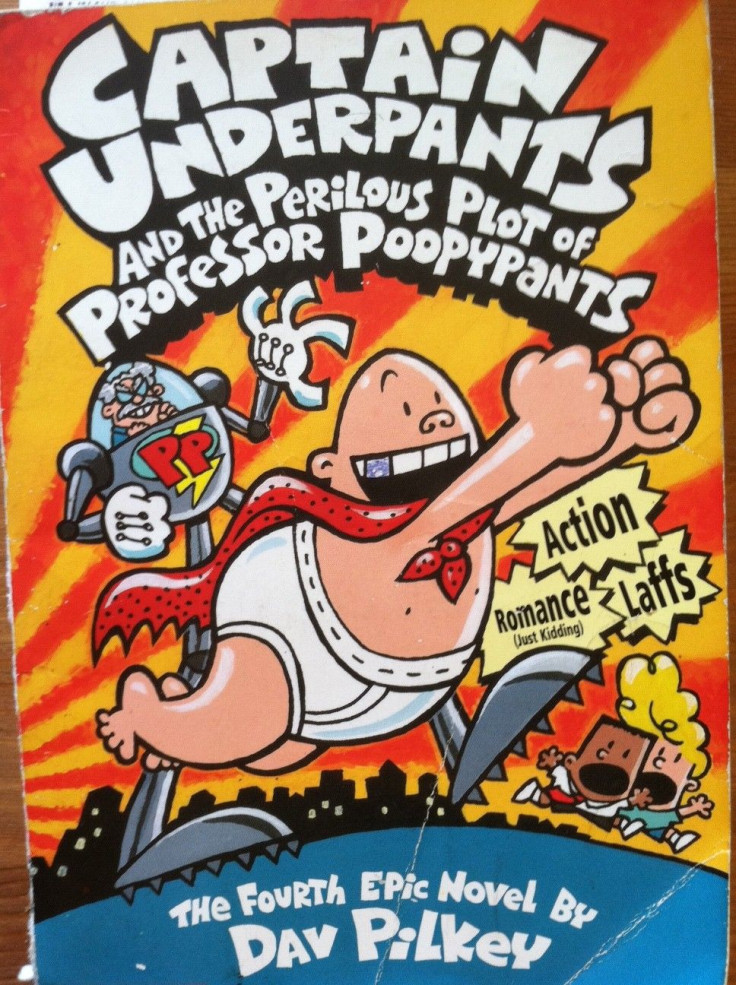Banned Books Week Spotlights Graphic Novels, Including 'Captain Underpants'

It’s Banned Books Week (Sept. 21 - 27), an annual awareness campaign that spotlights books people attempt to ban from schools and public libraries on the grounds that their content is offensive in some way -- and this year graphic novels are the main focus. “This year we spotlight graphic novels because, despite their serious literary merit and popularity as a genre, they are often subject to censorship,” said Judith Platt, chair of the Banned Books Week National Committee. "The most current list for 2013 includes two graphic novels: Dav Pilkey’s 'Captain Underpants' series for young children and Jeff Smith’s series 'Bone.'”
Last year, Chicago Public Schools attempted to ban Marjane Satrapi’s “Persepolis,” a graphic memoir about growing up during the Iranian Revolution. This year, members of the South Carolina House of Representatives voted to cut funding to the College of Charleston after a graphic memoir by recent MacArthur grant recipient Alison Bechdel was assigned as summer reading to incoming freshmen.
Bechdel’s best-selling and critically acclaimed memoir, “Fun Home,” tells the story of the author’s coming to terms with her discovery, only weeks before her father died, that he was gay. It also depicts lesbian sex scenes. Rep. Garry Smith, a Republican, accused the college of "promoting the gay and lesbian lifestyle,” the (Charleston) Post and Courier reported.
The state House's budget committee cut $52,000 from the school's appropriation, the cost of its summer reading program. When the full House considers the budget, the money could be restored, but perhaps won't relieve the chilling effect of threats to funding for simply assigning controversial books.
Banned Books Week was founded in 1982 by First Amendment and library activist Judith Krug, and is sponsored by the American Library Association, the American Booksellers Association, the American Society of Journalists and Authors, and other groups.
Each year, the ALA’s Office for Intellectual Freedom creates a list of the top 10 most frequently challenged books to inform the public about censorship in libraries and schools. A book is considered “challenged” when a formal, written complaint is filed with a school or public library or school classroom asking that a book be removed because of content or appropriateness. It’s estimated that for every challenge recorded, four or five are unreported. A book can be challenged for any number of reasons, and often in combination. Books are challenged primarily because they are deemed sexually explicit, contain “offensive” language, are “unsuited” for the age group to which they’re made available or present themes depicting violence or homosexuality.
Libraries, schools and bookstores across the country will commemorate Banned Books Week by hosting special events and exhibits that explain the dangers of censorship and by featuring selections from the ALA Office for Intellectual Freedom’s Top 10 Most Frequently Challenged Books of 2013, which includes Toni Morrison's "The Bluest Eye," Suzanne Collins' "The Hunger Games" series and E.L James' "Fifty Shades of Grey."
Since 1990, the Office for Intellectual Freedom has received reports of more than 18,000 attempts to remove materials in schools and libraries for content deemed by some as inappropriate, controversial or even dangerous.
“Our most basic freedom in a democratic society is our First Amendment right of the freedom to read,” ALA President Courtney Young said. “Banned Books Week is an opportunity for all of us -- community residents, librarians, authors and educators -- to stand together protecting this fundamental right for everyone and for future generations. We can never take this precious right for granted.”
© Copyright IBTimes 2024. All rights reserved.












